If you are new to skincare, a simple routine is the best place to start.
Forget about the complex 10-step routines you see on Instagram and TikTok that overwhelm you and make you feel like you’re missing out on healthy skin and start with the basics.
But if you’re unsure what the basics are and want to learn more about how to create the perfect simple skincare routine, here’s your guide.
In this article, I will show you how to build a beginner skincare routine that will effectively target your skin concerns and improve your skin’s health and appearance in the long run.

Why Is a Skincare Routine Important?
Just like you would maintain a healthy diet to minimize your chances of experiencing health concerns such as heart disease, diabetes, and hormonal imbalances down the line, you should have a skincare routine to minimize your chances of experiencing skin issues.
When it comes to skincare, consistency is key. Imagine your skin as a living, breathing entity that thrives off of routines, much like our bodies do with a balanced diet and regular exercise.
For starters, a consistent skincare routine helps maintain your skin’s overall health, making it stronger and more resilient over time.
This is crucial in fighting off environmental aggressors like pollution, free radicals, and sun damage that we are all exposed to daily and can lead to premature skin aging.
Next up, consistency can help manage skin conditions such as acne.
It might take time to see results, but sticking with a tailored routine can help clear up existing acne and prevent future breakouts.
This will also prevent future acne scarring, which, depending on the severity, can be challenging, expensive, and uncomfortable to treat, as treatment usually involves microneedling and laser sessions that can cost a lot of money and come with days or even weeks of recovery time.
Furthermore, a consistent skincare routine can also prevent pigmentary issues such as sun spots and hyperpigmentation from forming or getting darker and being incredibly difficult to fade.
Finally, remember these issues take time and negligence to form, but they are incredibly hard to eliminate once they do.
Therefore, it’s always easier to prevent or treat them in their beginning stage than to allow them to worsen over time and require more complicated treatments.
These are all the reasons why having a skincare routine is important.
How to Create The Right Skincare Routine (As a Beginner)
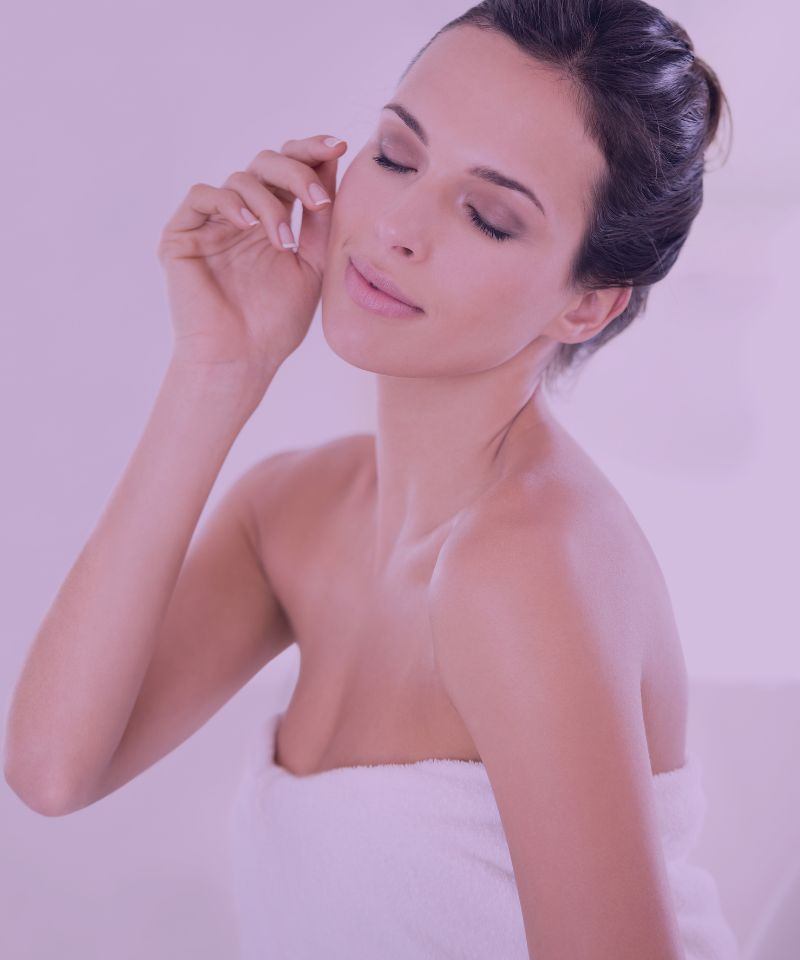
Here are a few things to consider when building a skincare routine for beginners:
Know Your Skin Type
Understanding your skin type is the first step to creating an effective skincare routine, as it will help you select the right products suitable for your specific skin needs.
For instance, if you have oily skin, you’d want to use products that control excess oil production without stripping your skin too much, as this can have the opposite effect and cause the oil-producing glands to secrete more oil to compensate for the dryness.
On the other hand, if your skin is dry, you would want to pick products that deeply moisturize and nourish it.
If your skin is sensitive, you’d want to avoid harsh, irritating ingredients and opt for gentle products that don’t contain drying alcohol and fragrance.
Thus, knowing your skin type narrows down the vast pool of products in the market, saving you the time and money you might otherwise spend on trial and error.
Determine Your Skin Concerns
Knowing your skin type will put you in the right direction for creating a skincare routine, but that doesn’t mean you have to go out and buy every product suitable for oily, dry, or combination skin.
Instead, after determining your skin type, you should determine what skin concern you want to tackle with the skincare routine you are creating.
If you are dealing with oily skin and are currently experiencing acne breakouts, the reasonable thing to do when creating a skincare routine is to include a product that will help reduce the overgrowth of the acne-causing bacteria on your skin instead of buying a product that will deeply hydrate the skin if your skin isn’t dehydrated.
On the other hand, if you are dealing with dark spots and hyperpigmentation, your skincare routine should include products that contain brightening components that will help fade some of that excess pigment instead of products that are more suitable for a skin concern you don’t have.
Finally, if you are dealing with dry, dehydrated, and sensitive skin, you should opt for products that will help soothe and nourish your skin instead of investing your money in products containing a bunch of irritating active ingredients that can exacerbate your skin concerns.
Therefore, always consider your skin concern before purchasing any skincare product.
Keep it Simple
When you’re new to the world of skincare, it’s easy to get overwhelmed by the plethora of products available and the seemingly endless steps that your favorite beauty influencer advises you to implement.
However, the truth is you don’t need a ten-step skincare routine to have healthy skin, and you can easily achieve your skin goals with a simple skincare regimen that caters to your skin type and skin concerns.
A basic skincare routine usually involves cleansing, moisturizing, and sun protection. These three steps are the pillars of a simple skincare regimen that can deliver noticeable results over time.
Starting with a basic routine allows your skin to adapt to new products and helps you understand how your skin responds to each product.
This is important because using too many products at once can irritate your skin and make it difficult to pinpoint any problematic ingredients.
Moreover, a simple skincare regimen is often more sustainable in the long run, as it is easier to stick to a routine that is not too time-consuming or complex, especially if you have a busy schedule and are often too tired to do anything at the end of the day.
As you become more comfortable with your routine and understand your skin’s needs, you can gradually add more targeted treatments, like serums or masks, to address specific skin concerns.
So, for beginners: keep it simple, be consistent, and give your skin the time it needs to adjust.
Remember, skincare is not a race. It’s a lifelong journey of learning about your skin and what it needs to remain healthy and glowing.
Understand The Skincare Products You Are Using
Before purchasing any skincare product, you need to ask yourself if you understand how this skincare product works and how your skin will benefit from its action.
Understanding the mechanism of action of your skincare products is as crucial as knowing your skin type and concerns.
A product’s effectiveness largely depends on its active ingredients and their functions.
For example, cleansers with salicylic acid work by penetrating pores to dissolve excess oil and prevent acne, while those with hyaluronic acid hydrate and plump up the skin.
Therefore, before buying a product, research its key ingredients as well as their benefits and drawbacks.
Don’t be swayed by attractive packaging or marketing hype. Instead, focus on its components and how they can address your skin concerns.
This will ensure you do not buy ineffective products or those that could potentially harm your skin.
Also, consider the potential side effects of the product you want to try out.
For example, if your skin is currently clear but is generally acne-prone and you want to introduce a retinoid into your routine, chances are that you will purge initially.
Therefore, if you have an important event that you don’t want your skin to break out for, it’s best to wait until after the event before introducing a product that could cause your skin to break out initially.
In summary, by getting informed about the ingredients in your skincare products and how they function, you will be able to determine whether a product is suitable for your skin at that time and can help you achieve your skincare goals in the long run.
Use Skincare Products Correctly
Understanding how skincare products work can help determine which products will benefit your skin.
However, to maximize the potential of your skincare products, you must also understand how to use them correctly.
Skincare products can be misused in several ways, undermining their efficacy and potentially causing harm to the skin.
One common misuse is overuse. Many users believe using more of a product will expedite results, but this is far from the truth.
Overuse of skincare products can increase the chances of irritation, dryness, sensitivity, or even breakouts.
Additionally, overusing skincare products leads to unnecessary waste because our skin is an organ designed to keep things out, which is why very little skincare product absorbs into the skin.
Another common error is not using products in the correct order.
The general rule of thumb is to apply products in order of their consistency, from thinnest to thickest.
Serums, which are usually lightweight, should be applied before heavier creams or oils.
Misordering can prevent products from fully penetrating the skin, thus reducing their effectiveness.
Additionally, another common error is not waiting in between steps or waiting for too long.
For example, hydrating toners, serums, and moisturizers should be applied to the skin while it’s still damp from the previous step.
The reason for this is that these products usually contain humectants, which work better on damp skin.
On the other hand, products such as retinoids and sunscreens should be applied to dry skin as retinoids will be less irritating this way, and sunscreens won’t absorb into the skin but will instead stay on its surface and provide a barrier between the skin and the UV rays.
Lastly, the final common mistake many people make with their skincare products is expecting immediate results and switching products too frequently when they don’t see an overnight difference in their skin.
This not only leads to wasting products but won’t give you effective results because most products take time to work, and having a complete routine that works for your skin will only show visible changes after 3-6 months of consistent use.
Therefore, properly utilizing skincare products is as important as investing in the right ones.
Misuse can not only prevent you from reaping the full benefits but may also lead to unwanted skin issues.
The Basic Steps of a Simple Skincare Routine
Here are the three most important steps in a basic skincare routine for beginners:
Cleanser
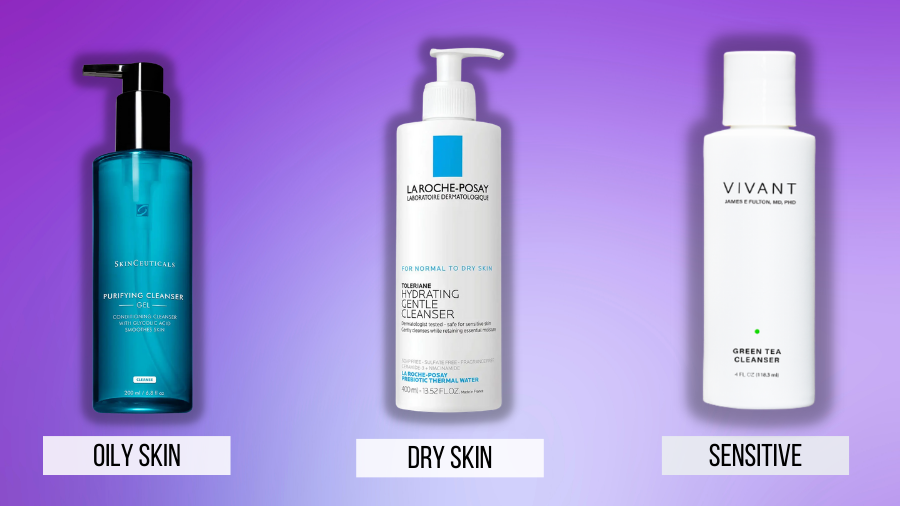
Cleansing is the first and arguably one of the most crucial steps in a simple skincare routine.
A cleanser will help remove dirt, oil, makeup, dead skin cells, and other environmental pollutants from your skin’s surface, preventing them from clogging your pores and leading to problems like acne and texture.
Additionally, by cleansing your skin, you’re giving it a clean slate, enabling it to absorb the rest of the skincare products more effectively.
Choosing the right cleanser is a personal journey, as it comes down to your skin type and concerns.
For dry and sensitive skin, a gentle, hydrating cleanser is usually the best option. These cleansers will help maintain the skin’s natural moisture barrier without causing irritation.
On the other hand, if you have oily or acne-prone skin, a foaming or gel cleanser may be more beneficial, as these don’t usually contain emollients and other heavy ingredients that can leave an oily residue on the skin.
Therefore, when choosing a cleanser, always pay attention to the consistency and ingredients, as well as your skin type and concerns.
Best cleanser for oily skin: SkinCeuticals – Purifying Cleanser, $39
Best cleanser for dry skin: La Roche-Posay – Toleriane Hydrating Gentle Cleanser, $17
Best cleanser for sensitive skin: Vivant Skin Care – Green Tea Cleanser, $22
Moisturizer
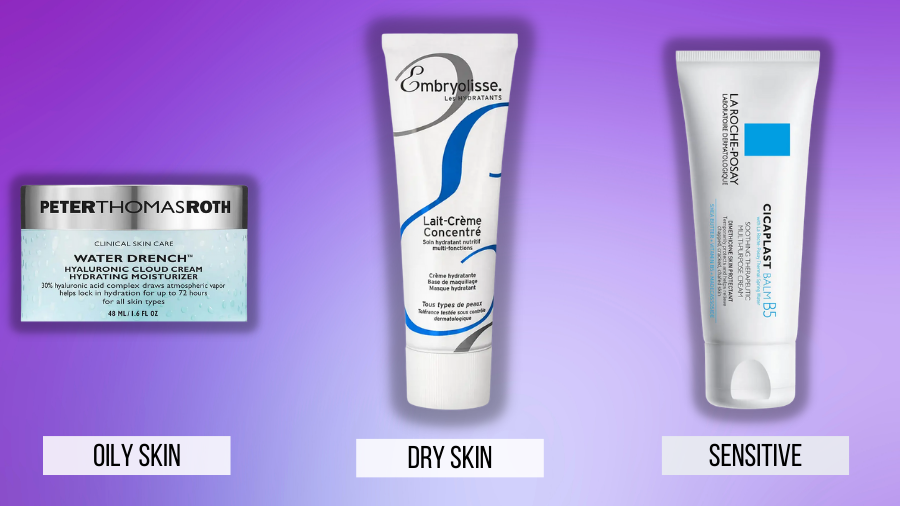
Moisturizing is the second crucial step of a simple skincare routine and should not be overlooked, regardless of skin type.
A moisturizer creates a barrier on the skin’s surface, preventing moisture from evaporating and leaving the skin dry and tight.
Moreover, a moisturizer will form a layer of protection to keep the skin barrier healthy and resilient against environmental stressors.
Choosing the right moisturizer, much like a cleanser, largely depends on your skin type and concerns.
If you have dry skin, look for a cream or lotion that contains ingredients like hyaluronic acid or ceramides, which can provide intense hydration.
For oily skin, a lightweight, oil-free moisturizer will add necessary hydration without contributing to excessive oil build-up.
Sensitive skin types would benefit from fragrance-free formulas to avoid potential irritants.
In addition to skin type, consider your climate. If you live in a dry, cold climate, you might need a heavier cream, while a lighter moisturizer may suffice in humid, hot climates.
With the right moisturizer, your skin will feel hydrated, plump, and comfortable, paving the way for any additional skincare steps you may choose to add.
Best moisturizer for oily skin: Peter Thomas Roth – Water Drench Hydrating Moisturizer, $54
Best moisturizer for dry skin: Embryolisse – Lait-Creme Concentre, $16
Best moisturizer for sensitive skin: La Roche-Posay – Cicaplast Baume B5, $17
Sunscreen
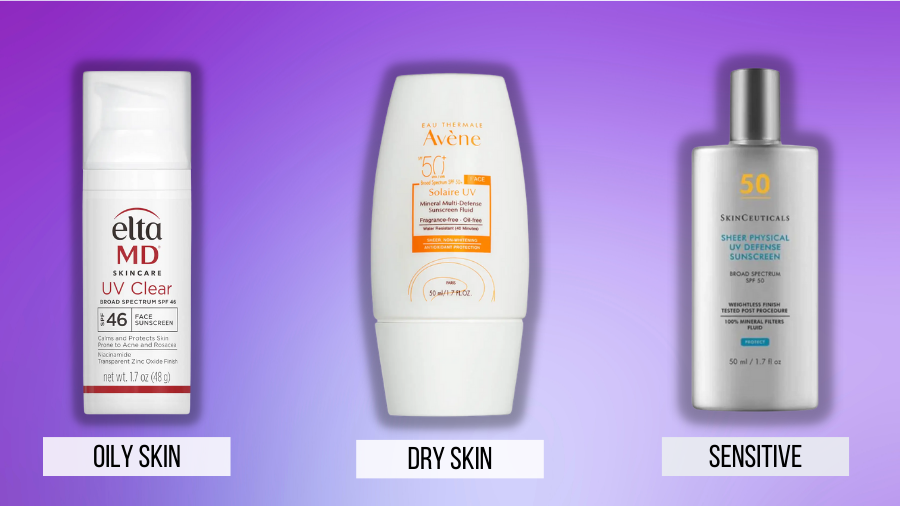
Sunscreen is the third and non-negotiable step in any skincare routine
It’s essentially your primary defense against harmful UV rays from the sun, which are known to cause cellular damage that leads to premature aging, pigmentation, and increases the risk of skin cancer.
Sunscreen protects your skin and allows it to heal and reverse some of the damage that may already be done.
Choosing the right sunscreen can seem daunting, but it’s all about understanding your skin’s needs and the environment you live in.
Firstly, always choose a sunscreen with a broad spectrum (protects against both UVA and UVB rays) and an SPF of at least 30.
For oily or acne-prone skin, look for non-comedogenic sunscreens that don’t contain heavy emollients, oils, and silicones to potentially clog pores and cause breakouts.
For dry skin, opt for sunscreens that contain these ingredients, as they will nourish and soften a dry, rough texture and give you a glowing complexion.
If you have sensitive skin, mineral sunscreens are usually a safer bet as they are less likely to cause a reaction.
Remember, sunscreen is not just for sunny days; it should be worn daily, even when it’s cloudy, as some UV rays, such as UVAs, are present all year round and can penetrate clouds and windows.
And don’t forget to reapply every two hours or immediately after excessive sweating or swimming.
With the right sunscreen, you’re not just taking the final step in your skincare routine; you’re also making a long-term investment in the health and appearance of your skin.
Best sunscreen for oily skin: EltaMD – UV Clear Broad-Spectrum SPF 46, $41
Best sunscreen for dry skin: Avene – UV Mineral Multi-Defense Sunscreen Fluid SPF 50+, $36
Best sunscreen for sensitive skin: SkinCeuticals – Sheer Physical UV Defense SPF 50 Mineral Sunscreen, $42
Additional Steps in a Skincare Routine
Once you have gotten used to the basics of skincare, there are some extra steps that can be added to your routine.
These products will tackle a particular skin concern and improve your skin’s overall health and appearance by performing a targeted action.
Here are three excellent additions to a beginner’s basic skincare routine:
Exfoliator
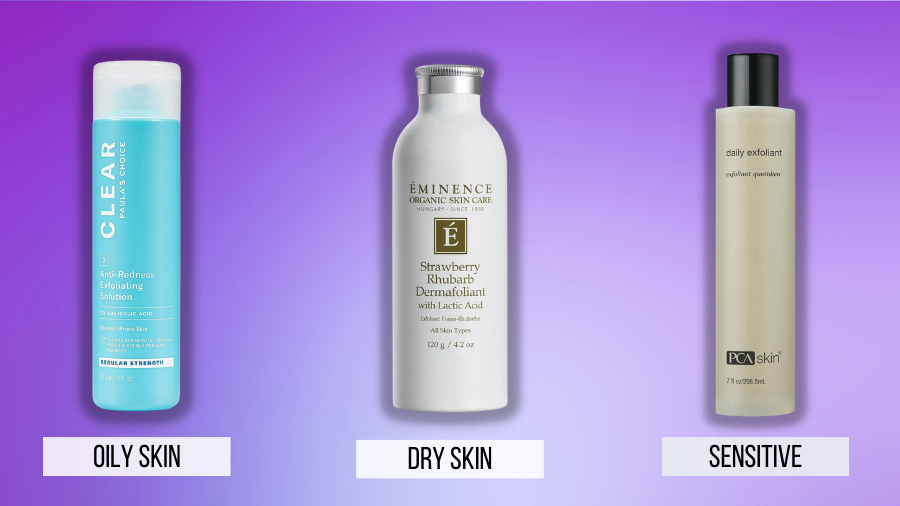
Exfoliating is an essential step in a comprehensive skincare routine that beginners can often overlook.
This process involves the removal of dead skin cells from the surface of your skin. By doing so, exfoliation can help prevent clogged pores, which are a common cause of breakouts.
Moreover, regular exfoliation can enhance your skin’s ability to absorb other skincare products, making them more effective.
There are two primary types of exfoliators: physical and chemical.
Physical exfoliators use small granules to scrub away dead skin cells manually. These are generally recommended for the body, where the skin is thicker.
Conversely, chemical exfoliators use alpha and beta hydroxy acids to dissolve the proteins that hold dead skin cells together and encourage them to shed naturally.
These are better for facial skin as they tend to be less abrasive than their physical counterparts.
When choosing the right exfoliator, consider your skin type and your main skin concerns.
For those with oily or acne-prone skin, a salicylic acid-based exfoliator can be beneficial.
If you have dry skin, look for products containing lactic acid, as it also moisturizes while exfoliating.
If you have sensitive skin, opt for a low-percentage acid exfoliator that doesn’t contain added alcohol and irritating fragrance.
Now, how many times you should exfoliate is generally dependent on how much your skin can handle.
However, to avoid dryness and irritation from over-exfoliation, it’s best to start exfoliating twice a week and adjust based on your skin’s response.
Best exfoliator for oily skin: Paula’s Choice – Regular Strength Anti-Redness Exfoliating Solution, $34
Best exfoliator for dry skin: Eminence – Strawberry Rhubarb Dermafoliant, $55
Best exfoliator for sensitive skin: PCA SKIN – Daily Exfoliant, $44
Retinoid
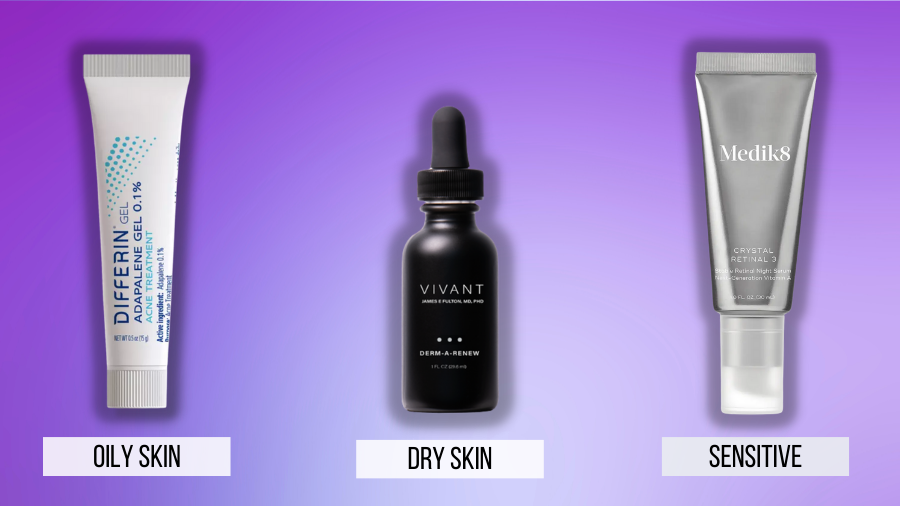
Retinoids are pivotal skincare components known for their potent anti-aging and acne-fighting capabilities.
Essentially, they work by stimulating cellular turnover, resulting in the shedding of dead skin cells and encouraging the production of new ones.
This remarkable process can help soften fine lines, smooth out skin texture, soothe inflammatory skin conditions such as acne, and fade hyperpigmentation.
When incorporating retinoids into your skincare routine, starting slow is crucial, as the increased cellular turnover can cause your skin to shed, flake, and become irritated in the first few weeks of the adjustment period.
To avoid this, start with a lower concentration and gradually work your way up as your skin builds tolerance.
Choosing the right retinoid depends mainly on your skin’s needs and sensitivities.
Over-the-counter retinols are less potent and can be a great starting point for individuals new to retinoids.
Prescription retinoids, like tretinoin, are much stronger and could be opted for if your skin is more tolerant or if you’re dealing with more severe skin conditions like cystic acne.
For sensitive skin, look for low-strength retinoids that also contain soothing ingredients.
But, regardless of the product you choose, always apply retinoids at night as they are unstable in the presence of sunlight and could end up causing more harm than good.
And remember, always use sunscreen during the day when using retinoids, as they can increase your skin’s sensitivity to UV rays.
With the right retinoid and a patient approach, you can significantly enhance your skin’s health and appearance.
Best retinoid for oily skin: Differin – 0.1% Adapalene Treatment Gel, $18
Best retinoid for dry skin: Vivant Skin Care – Derm-A-Renew, $122
Best retinoid for sensitive skin: Medik8 – Crystal Retinal 3 Serum, $62
Vitamin C
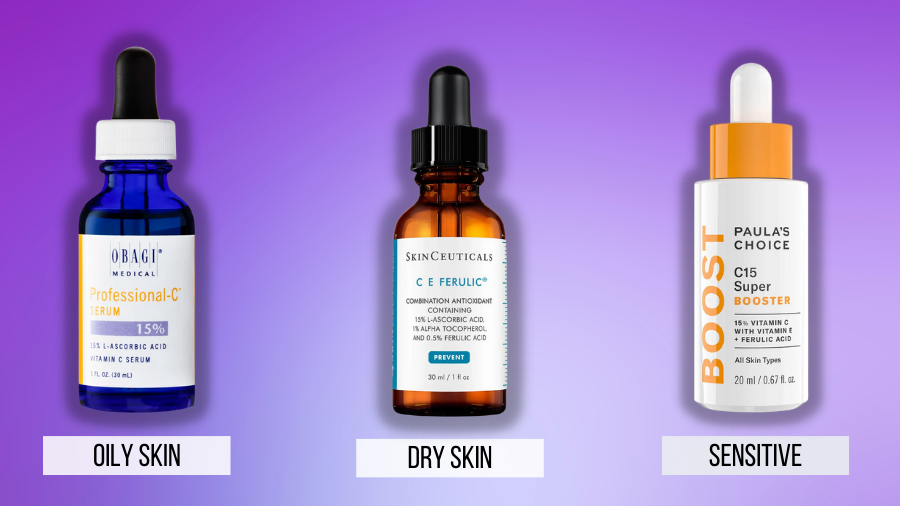
Vitamin C is a powerhouse antioxidant that plays a vital role in a skincare routine due to its many benefits.
Not only does it help fight against free radical damage caused by environmental factors like pollution and sun exposure, but it also brightens the skin and can help reduce visible signs of aging by boosting collagen production.
When choosing a vitamin C product for your skincare routine, take into consideration your skin type, specific skin concerns, and your budget, as it is widely known that vitamin C is an unstable molecule that costs more to produce, so more expensive products are generally better, which isn’t always the case for other skincare products.
Vitamin C serums are also sensitive to light and air, so opt for ones packaged in dark and airtight bottles, and try to use it up within a few months of opening it to ensure the maximum potency and efficacy.
This is not to say that you can’t find a good vitamin C serum on a budget; however, just be sure to read through the reviews and ingredients carefully before making a purchase.
Sadly, a good vitamin C product is an investment, so make sure you take that into consideration before introducing it into your skincare routine.
However, with the correct vitamin C product incorporated into your skincare routine, you can look forward to a brighter, healthier, and more youthful complexion.
Best vitamin C for oily skin: Obagi –Professional-C Serum 15%, $115
Best vitamin C for dry skin: SkinCeuticals – C E Ferulic, $182
Best vitamin C for sensitive skin: Paula’s Choice – C15 Super Booster, $55

My name is Simone and I am a certified skin specialist. I created this website to teach my readers how to take great care of their skin and I also like to occasionally share my honest opinions on skincare products I’ve tried. You can learn more about me here.
